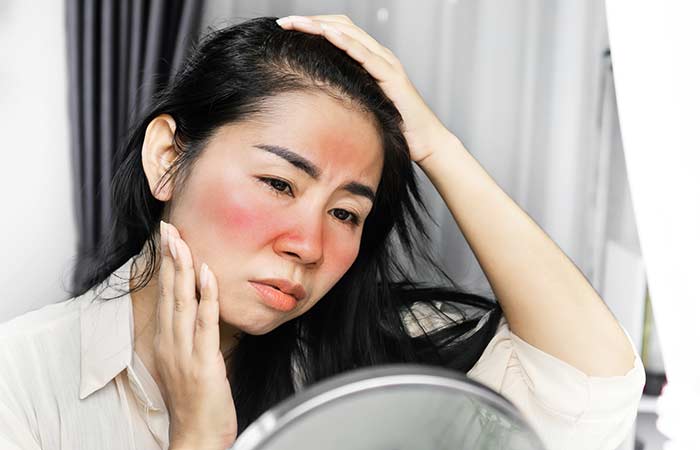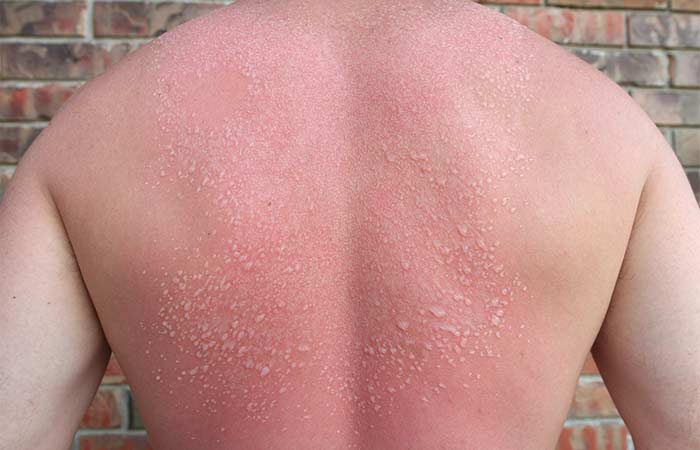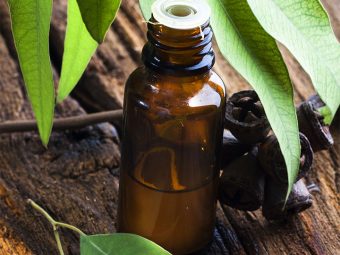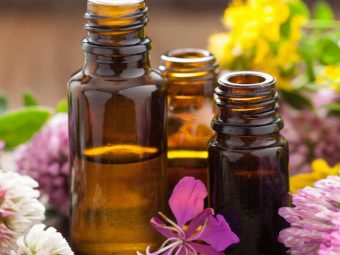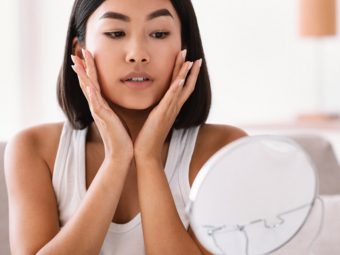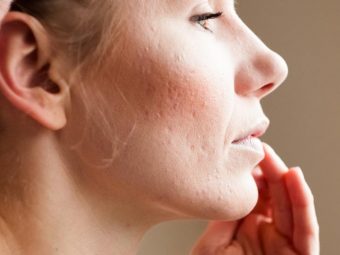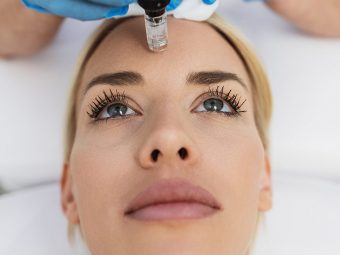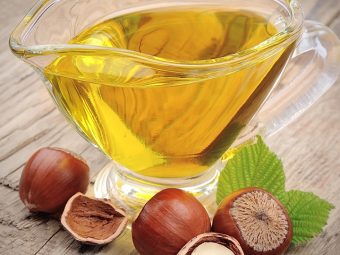Sunburn Vs. Sun Poisoning: An Overview
Learn the exact differences between the two to know when to seek medical attention.

Almost everyone has experienced the pain caused by sunburn. However, ever wondered about the difference between sunburn and sun poisoning?
Excessive sun exposure can cause redness, peeling, irritation, and pain, leading to sunburn. However, sunburn is often confused with sun poisoning, a serious medical condition. This article explains the differences between sunburn and sun poisoning, risk factors, remedies, and prevention tips. Continue reading to learn more.
In This Article
What Is Sunburn?
iStock
A sunburn is your body’s natural inflammatory response to the sun’s ultraviolet (UV) radiation damaging your skin’s outer layer. This form of damage is more likely to occur when your skin is exposed to the sun for extensive periods.
Extreme sunburn may lead to sun poisoning, which can cause symptoms like severe blistering and peeling and dizziness. Let’s understand in detail.
What Is Sun Poisoning?
iStock
Sun poisoning is a severe sunburn that can develop after extended UV exposure. While mild sunburn usually heals in about one week, sun poisoning is a more serious complication that can take several weeks to heal, depending on the severity of the damage to your skin. As a result, sun poisoning can be considered an allergic reaction to excessive UV exposure. The next section explains the key differences between the two conditions.
Sunburn Vs. Sun Poisoning: Key Differences
Daniel Boyer, M.D., Author at Farr Institute, explains, Sunburn causes irritation or redness on your skin when exposed to the sun for shorter periods, while sun poisoning is the skin’s allergic reactions that are severe due to exposure to the sun for a longer period. In addition, the skin’s level of damage due to sunburn may depend on the location, duration of exposure, and the skin type, while sun poisoning tends to cause severe symptoms irrespective of those factors when you expose your skin to the intense sun for long.”
You can check the symptoms to determine whether it is a sunburn or sun poisoning.
Symptoms
Sunburn
- Redness
- Swelling
- Itching
- Tenderness
- Skin that is warm to the touch
Sun Poisoning
- Itchy red rash
- Blistering
- Skin peeling
- Dehydration
- Headache or dizziness
- Fever or chills
- Nausea
- Joint pain
- Muscle aches
Some people are at a greater risk of sunburn and sun poisoning. Knowing the risk factors may help you take preventive measures. Scroll down to check them out.
Risk Factors
You are more likely to burn in the sun if you:
- Have light or fair skin
- Live near the equator or at high altitudes
- Work outdoors
- Swim or wet your skin with water, as wet skin burns faster than dry skin
- Drink alcohol while outdoors in the heat
- Do not use sun protection
- Have medical conditions like lupus, eczema, and rosacea
- Take antibiotics, birth control pills, or acne medications
Dr. Boyer adds, “Sunburns are caused when sensitive skin is exposed to the sun for a shorter period while sun poisoning is a result of exposure of the skin to UV rays for longer periods irrespective of the skin type.”
Several home treatments can help you soothe the symptoms of sunburn and sun poisoning. Read the next section to find out.
Natural Remedies To Try
1. Apply Aloe Vera Gel
Aloe vera is known for its burn-healing abilities, making it a good choice for treating sunburn blisters. Its anti-inflammatory characteristics aid in alleviating pain and inflammation caused by burns and wounds (1).
Aloe vera gel can soothe and moisturize the skin and increase collagen formation. However, apply aloe vera gel if your blisters are still intact, as open sores can get irritated and infected.
2. Try Cold Compress And Cold Showers
Using a cold compress or taking a cool shower or bath will not guarantee that the peeling will subside. However, the cool temperatures may provide temporary relief if the affected area feels warm, inflamed, and causes discomfort.
You can make a cold compress at home by filling a thick plastic bag with ice cubes. However, never use ice directly on sunburned skin since the extreme cold may cause further harm to the skin, worsening peeling and delaying the healing process.
3. Stay Hydrated
You must let your skin heal from within. Nothing is more beneficial to your skin than a big glass of water. Staying hydrated is essential for healthy skin. Water becomes even more necessary when your skin is damaged due to sunburn.
4. Take An Oatmeal Bath
Colloidal oatmeal contains anti-inflammatory qualities that can help to relieve burns, swelling, itching, and other skin conditions (2). It also aids the skin’s ability to retain moisture, promoting healing. Colloidal oatmeal is not the same as breakfast oatmeal. Whole oats are used to make colloidal oatmeal. Grind uncooked whole oats in a food processor into a fine powder. Mix a cup of oatmeal powder in a tub of room temperature water and soak in it for 10-15 minutes.
5. Treat The Blisters
Treat the affected area gently with soap and water if a blister pops open. Then, apply antibiotic ointment and cover the exposed skin with non-stick gauze or a bandage. If a rash develops or the symptoms worsen, consult your doctor immediately.
6. Take Anti-Inflammatory Medicine
Aspirin or ibuprofen are non-steroidal anti-inflammatory drugs that can calm the skin and reduce the pain associated with sunburn.
You can either take medication or break aspirin or ibuprofen tablets and combine them with water to make a paste that you can gently apply to the affected area. Anti-inflammatory creams are also available. Avoid petroleum or oil-based lotions, just as you should avoid moisturizers.
You can also try home remedies to soothe sunburn. There isn’t much scientific evidence to support any home or natural sunburn remedies. However, most home or natural remedies are safe unless you are allergic to the ingredients. You may try:
- Applying menthol shaving cream to the skin
- Using baking soda in a cool bath
- Applying honey to the affected area
You must be extremely cautious about sun exposure, especially if you are at a higher risk of sunburn and sun poisoning. Here are a few ways to prevent these conditions and protect your skin.
How To Prevent Sunburn And Sun Poisoning
- Stay out of the sun as much as possible.
- While going out, wear protective clothing like hats and long-sleeved garments.
- Apply sunscreen 15 to 30 minutes before going outside and then reapply every two hours.
- Certain medications may make your skin sun-sensitive. Be mindful of that.
- Drink plenty of water to prevent dehydration.
- Keep infants out of direct sunlight.
- Do not use tanning beds.
If the sunburn symptoms are severe or linger for a long time, you should seek medical advice. Since the symptoms of sun poisoning are severe, you must visit a doctor and start treatment immediately.
When To See A Doctor
The majority of cases of sun poisoning will improve with time and self-care. In some cases, though, seeing a doctor is advised.
It is recommended that you seek medical assistance if the affected area is extensive. Even if the sun poisoning is minor, obtaining medical advice helps ensure that it is effectively managed. This can help avoid complications and alleviate symptoms quickly.
To Sum Up
A sunburn is a red, painful, or sore skin caused by unprotected sun exposure. Sun poisoning may initially show sunburn-like symptoms, but it is a severe condition. But don’t be concerned! You can try the remedies and tips discussed in the article to alleviate the symptoms and relieve pain. However, sun poisoning may necessitate medical attention. Both the conditions can raise your chance of extensive skin damage and cancer, so ensure that you protect yourself from UV exposure.
Frequently Asked Questions
Can too much sun make you sick the next day?
Yes, overexposure to the sun may make you feel sick the next day. You may experience vomiting, chills, fever, headache, nausea, and giddiness.
Is sun poisoning serious?
Yes, sun poisoning can be life-threatening if left untreated. Adequate hydration and medicinal compliance help in the effective management of sun poisoning.
Key Takeaways
- A sunburn is your body’s natural inflammatory reaction to ultraviolet (UV) rays that may damage the outer layer of your skin.
- Sun poisoning is severe sunburn that occurs after prolonged exposure to UV rays.
- Home remedies may help you alleviate the symptoms and relieve pain caused by sunburn.
- Sun poisoning demands immediate medical intervention.
Sources
Articles on StyleCraze are backed by verified information from peer-reviewed and academic research papers, reputed organizations, research institutions, and medical associations to ensure accuracy and relevance. Read our editorial policy to learn more.
- The Effect of Aloe Vera Clinical Trials on Prevention and Healing of Skin Wound: A Systematic Review
https://www.ncbi.nlm.nih.gov/pmc/articles/PMC6330525/ - Anti-inflammatory activities of colloidal oatmeal (Avena sativa) contribute to the effectiveness of oats in treatment of itch associated with dry irritated skin
https://pubmed.ncbi.nlm.nih.gov/25607907/


